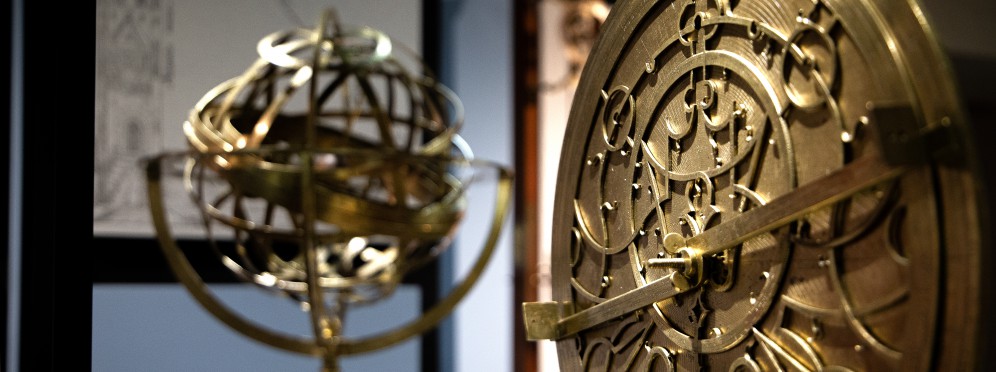Giovanni Poleni Museum
Visit

OPENING HOURS Sunday: 14.30-18.30 (until 29 Dicember 2024)
TICKETS ARE ONLY AVAILABLE ONLINE - Buy your ticket
Ticket: 3 Euros
Family ticket (2 adults and max. 3 kids up to 17 years old): 6 Euros
Free entrance: kids up to 12 years old; people with disabilities and an a accompanying person; students and staff of Padua University, including senior staff, with UniPd badge; members of the Associazione degli Amici dell'Università di Padova; ICOM and ANMS members; journalists and guides with currently valid badge.
In the Museum, it is possible to use the free of charge audioguide, available on your mobile through a QR code.
Purchasing the integrated ticket Padua City of Science you can access the Museum for free.
GUIDED TOURS and WORKSHOPS
It is possible to visit the Museum accompanied by a guide, following different themed itineraries. We also offer different types of workshops to be carried out in the museum.
All activities require reservations.
Guided tours and workshops are from Monday to Friday from 9.00 to 18.30 and on Saturdays and Sundays during opening hours.
The cost is 50 euros per groups of max. 15 people. The groups must be previously set up.
GUIDED TOURS
• General visit of the Museum
Duration: 1 hour, cost: € 50 per group (max. 15 people), maximum 3 groups at the same time
• Giovanni Poleni: experimental physics in 18th-century Padua
Duration 1 hour, cost: € 50 per group (max. 15 people), maximum 3 groups at the same time
The guided tour will focus on the collection that Giovanni Poleni, first professor of experimental physics at the University of Padua, started setting up from 1739 both for his own research and for his spectacular physics lessons, based on experiments and demonstrations.
For example, we will discover an optical chamber, similar to the one used by Canaletto, a very rare eighteenth-century "pressure cooker", mechanical paradoxes, optical games, but also models of machines that played an important role in the history of the Republic of Venice.
• Light and colors
Duration 1 hour, cost: € 50 per group (max. 15 people), maximum 2 groups at the same time
Who discovered that white light is made up of many colours? How was the sun studied in the nineteenth century? When was the incandescent electric light bulb invented? And the neon lighting? The visit will answer these and many other questions, retracing the history of light studies from Antiquity to the beginning of the twentieth century.
• Inventions and scientific events in the history of Veneto
Duration 1 hour, cost: € 50 per group (max. 15 people), maximum 2 groups at the same time
Some of the first electric motors, as well as other instruments that have become commonly used, were invented in the Veneto region and are now kept in our Museum. Several of these objects have never been exhibited to the public until today. We invite you to discover them, along with many other devices that were the protagonists of major discoveries or events.
• Science and society between past and future
Duration 1 hour, cost: € 50 per group (max. 15 people), maximum 2 groups at the same time
Is physics useful or dangerous? How important is the social, economic and political context in the development of science and technology? Is it better to fund basic research or applied physics? Through the history of some instruments of the Museum, the visit offers food for thought on the relationship between science and society, between past and future.
• Spectra, glows and cosmic rays: at the beginnings of modern physics
Duration 1 hour, cost: € 50 per group (max. 15 people), maximum 2 groups at the same time
The visit shows how the developments of various sectors of physics, from optics to the study of electrical discharges in rarefied gases, contributed to the birth of modern physics. The beginnings of particle physics in Padua are also examined, with the pioneering works on cosmic rays carried out by Bruno Rossi and his successors.
ACTIVITIES FOR GROUPS
• At the heart of the Renaissance: how was the astrolabe used?
Duration: 1 hour, cost: € 50 for a group of maximum 15 people
Owned by emperors, kings and queens, as Charles V or Elizabeth I, the astrolabe was one of the most sophisticated instruments of the Renaissance, used in various fields, from the measurement of time to navigation, up to astrology. We propose you to retrace the footsteps of Renaissance mathematicians and learn to use an astrolabe.
ACTIVITIES FOR FAMILIES
• "Animated" guided tour
Duration 1 hour, cost: € 50 per group (max. 15 people), maximum 2 groups at the same time
Who discovered Jupiter's Satellites? How do bullets move? Until when was the Earth thought to be at the centre of the Universe? How did Galileo's telescope work? Why did people think that “nature abhors a vacuum"? These are some of the questions we will discuss, leading the public to discover the answers both through the Museum's ancient instruments and through some experiments. The itinerary, simple and fun, is a real journey into the past, up to the dawn of modern science.
Reservations Service
call 049 8273939
every day from 09:00 to 17:00
or send an e-mail to prenotazioni.musei@unipd.it
Scholars interested in the Museum's collections: please contact the museum’s curator Sofia Talas – email: sofia.talas@unipd.it
Accessibility
Visitors with limited mobility are asked to contact the curator to arrange a visit.


